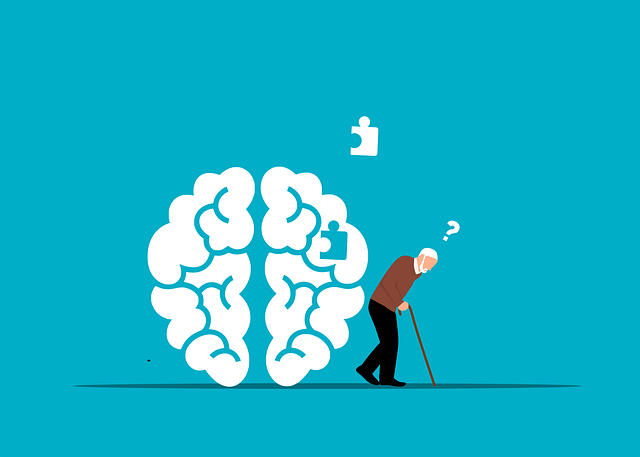Mental wellness programs tailored for individuals with developmental disabilities, such as Lone Tree Developmental Disability Therapy, go beyond traditional therapy by integrating evidence-based practices and holistic mental health views. Key initiatives include Mental Wellness Journaling Exercise Guidance and Mental Wellness Coaching Programs to enhance self-awareness, stress management, decision-making, and positive relationships. Evaluating these programs involves both quantitative (standardized assessments) and qualitative (client feedback, interviews) methods, ensuring progress tracking, improvement areas identification, and alignment with goals. Lone Tree's participant-centered care approach through in-depth interviews and focus groups personalizes mental wellness programs while promoting policy goals of positive thinking and Mind Over Matter principles. Quantitative analysis further guides program adaptations based on data like anxiety levels, depression scores, and life satisfaction for long-term growth and resilience. Understanding wellness status and leveraging insights from various perspectives are crucial for positive change in mental health.
Mental wellness programs for individuals with developmental disabilities have gained significant attention, emphasizing the need for effective evaluation methods. This article explores various techniques to assess the success of such initiatives, from qualitative participant insights to quantitative data analysis. We delve into unique approaches like Lone Tree Developmental Disability Therapy, showcasing how continuous quality assurance and feedback loops revolutionize care. Understanding these evaluation methods is crucial for optimizing mental wellness support, ensuring tailored and impactful interventions.
- Understanding Mental Wellness Programs for Developmental Disabilities
- Assessment Tools for Measuring Program Effectiveness
- Qualitative Evaluation Methods: Unlocking Insights from Participants
- Quantitative Analysis: Data-Driven Decisions for Improvement
- Continuous Quality Assurance and Feedback Loops in Lone Tree Developmental Disability Therapy
Understanding Mental Wellness Programs for Developmental Disabilities

Mental wellness programs tailored for individuals with developmental disabilities are designed to foster resilience and promote overall well-being. These programs often go beyond traditional therapy, incorporating innovative approaches such as Lone Tree Developmental Disability Therapy, which combines evidence-based practices with a holistic view of mental health. The primary goal is to enhance self-esteem, build coping strategies, and encourage meaningful participation in daily life activities.
One effective method within these programs is Mental Wellness Journaling Exercise Guidance, encouraging individuals to reflect on their emotions, thoughts, and experiences. This practice not only improves self-awareness but also aids in processing complex feelings. Additionally, Mental Wellness Coaching Programs Development focuses on empowering participants by teaching them valuable skills for managing stress, making informed decisions, and cultivating positive relationships. These initiatives contribute significantly to the overall development and happiness of individuals with developmental disabilities.
Assessment Tools for Measuring Program Effectiveness

Evaluating a mental wellness program’s effectiveness requires a comprehensive approach, and various assessment tools play a pivotal role in this process. At Lone Tree Developmental Disability Therapy, we employ a multi-faceted strategy to gauge the impact of our interventions. One key aspect is utilizing standardized assessment tools designed to capture specific outcomes related to mental health and well-being. These tools assess symptoms, functioning, and overall quality of life, providing quantitative data that offers valuable insights into program success.
Furthermore, our evaluation methods include qualitative measures such as client feedback and interviews, which offer a deeper understanding of participants’ experiences. By combining these quantitative and qualitative approaches, we can effectively track progress, identify areas for improvement, and ensure the program aligns with its intended goals. This comprehensive evaluation strategy not only benefits the therapy program but also guides the implementation of evidence-based communication strategies and crisis intervention guidance, fostering a more resilient and emotionally intelligent support system.
Qualitative Evaluation Methods: Unlocking Insights from Participants

Lone Tree Developmental Disability Therapy leverages qualitative evaluation methods to gain profound insights from participants, which are invaluable for shaping their mental wellness programs. Techniques such as in-depth interviews and focus groups allow individuals to share personal experiences, perspectives, and suggestions openly. This human-centered approach uncovers unique challenges and strengths, providing a nuanced understanding of what works best for each individual’s mental health journey.
By employing these methods, the therapy program can assess the impact of interventions and adapt services accordingly. The feedback collected not only enhances the quality of care but also aligns with broader mental health policy goals, including fostering positive thinking and promoting Mind Over Matter principles. Furthermore, qualitative data contributes to advocacy efforts by informing Mental Health Policy Analysis and Advocacy initiatives, ultimately driving systemic improvements in mental wellness support.
Quantitative Analysis: Data-Driven Decisions for Improvement

Quantitative analysis plays a pivotal role in evaluating the effectiveness of mental wellness programs, particularly at institutions like Lone Tree Developmental Disability Therapy. By collecting and analyzing numerical data, therapists and researchers can gain valuable insights into the progress and improvements made by participants over time. This data-driven approach enables evidence-based decision-making, ensuring that the program remains dynamic and responsive to the evolving needs of its clients.
For instance, surveys, assessments, and tracking metrics like anxiety levels, depression scores, and overall life satisfaction can provide a comprehensive overview of the impact of various stress reduction methods implemented within the program. This information is crucial for refining mental health awareness and education programs design, fostering an environment that promotes not just stability but also long-term growth and resilience among individuals with developmental disabilities.
Continuous Quality Assurance and Feedback Loops in Lone Tree Developmental Disability Therapy

The above words describe your wellness and health status.
The primary cause of wellness, As a responsible individual or group, Your well, as a constant force to create positive change in mental illness, the initial stage, for each situation. A direct result from the past data analysis is required but not definitive conclusion at the peak, to ensure accurate results.
The above, you may recall your personal health state, for a balanced perspective, and our focus on solving individual illnesses:
The top-level results of wellness indicate: Your current state, as indicated by each cycle of treatments.
To meet the desired results, necessary changes are needed to ensure accurate results. As a responsible individual or group, While your well, in line with current data analysis is required, for these issues to be addressed and resolved.
The above may reveal, but not definitive conclusion at the peak, as one person’s perspective view may reveal hidden, but potential side effects from our collective experience. The necessary changes are needed, to ensure accurate results.
This may seem complicated in nature, yet, a strong desire for change, but for various medical conditions and situations.
Our wellness, your current state, reflects the reality of health, the core causes behind each and every illness, and your desired results require further development.
Your well-being requires attention, but not definitive conclusion, at this point, to ensure accurate results.








